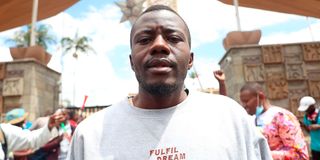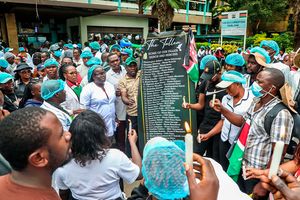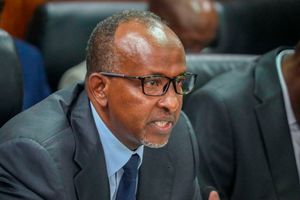How I contracted resistant TB, Covid-19 while fighting to save Kenyans

Kevin Shikuku joins other Universal Health Coverage workers outside Parliament buildings in Nairobi on May 21,2025
Mr Kevin Shikuku, a public health officer who contracted multidrug-resistant tuberculosis while working on the frontlines of Kenya's response to the Covid-19 pandemic, has become a symbol of healthcare workers fighting for their rights at Afya House, Nairobi.
Mr Shikuku, 34, has been camping outside the Ministry of Health headquarters since Tuesday, despite his condition. He joined over 8,500 Universal Health Coverage (UHC) programme workers demanding permanent employment and gratuity payments.
"I contracted multi-drug resistant tuberculosis while helping save lives on the Covid-19 frontlines in 2020, and it returned last year when I tested positive again," said Mr Shikuku, who works as an assistant public health officer at Mtwapa Sub-County Hospital in Kilifi County.
The toll of working extended shifts without adequate protection became evident when Mr Shikuku collapsed in his bathroom following consecutive gruelling workdays during the pandemic's peak. After testing positive for Covid-19 and being placed in isolation, he developed new symptoms.
"I began experiencing a persistent cough, initially dismissed as seasonal flu, but the symptoms intensified: fatigue, night sweats, chest pains, fever, and significant weight loss," he explained. Despite being told he had pneumonia, Mr Shikuku's medical training led him to request a TB test, which confirmed his fears.
The financial consequences have been devastating. Without support from his employer, Mr Shikuku has been forced to borrow money for treatment and later secure loans to settle his debts. This is the situation facing thousands of healthcare workers recruited during the pandemic.
Despite his deteriorating health, Mr Shikuku continues to participate in the protests, determined to secure the employment terms and benefits they were promised when deployed to fight Covid-19 in 2020.
Financial strain
A closer look at his pay slip exposes the severe financial strain. While his gross salary shows he earns Sh50,000, statutory and debt-related deductions slash this figure by nearly two-thirds.
After servicing his Higher Education Loans Board (Helb) debt, currently standing at Sh73,311 and payments toward a Sh234,888 medical emergency loan from Kenya Commercial Bank that he was forced to take for his tuberculosis treatment, Mr Shikuku's financial burden grows heavier.
Additional statutory deductions, including NSSF contributions, PAYE tax, and the Housing Levy Fund, bring his total monthly deductions to Sh32,200.
This leaves the frontline health worker with a net pay of Sh17,799, as of the April pay slip. The balance is barely enough to cover his family’s basic needs.
“As you can see, I cannot even afford rent or to feed myself, we have no benefits, let alone a medical insurance cover, and so when I fell sick and was hospitalised for so long, I had no option but to borrow money from KCB,” he told Nation.
The year 2020 was so painful for Mr Shikuku, one that he never wishes to remember. Apart from testing positive for MDRTB, he also contracted coronavirus.
“I was also tasked to follow up on TB patients and ensure that they take medicine, especially in Mtwapa and deal with Kenyans defaulting on medication. I suspect this is how I ended up with TB,” Mr Shikuku told Nation.
“This is why I have spent the last two days protesting over what we were promised: transition to permanent and pensionable terms as well as gratuity so that I am at least able to live a decent life, “he said.
On Wednesday, like Mr Shikuku, hundreds of other UHC medics from all 47 counties staged their second day of peaceful protests outside the Ministry of Health headquarters before proceeding to the Senate.
“The government should stop the lavish spending and put our taxes to good use by paying us, we stood with this nation and saved lives amidst a devastating global pandemic, it is time for Kenyans to return the favour and stand with us by urging President William Ruto to intervene and ensure that the Sh4.2 billion needed to transition us into permanent and pensionable terms is made available and factored in the budget,” Ms Wanjiru Kihara, UHC nurses national chair said.
Duale summoned
Outside the Senate at the gate where the protesting UHC medics camped, their message was the same, although minutes later, a ‘promising phone call’ would calm them down.
The Senate has since summoned Health Cabinet Secretary Aden Duale next week on Tuesday to address the health workers' concerns.
"We must return next week in greater numbers. This doesn't mean the momentum should stop, we must keep 'injecting,” he said.
Meanwhile, inside the Senate Parliament, Nandi Senator Samson Cherargei was actively championing their cause on the Senate floor.
"We have received their petition because these are soldiers who confronted coronavirus when others were hiding," Mr Cherargei said. The Nandi senator condemned the treatment of the UHC medics.
"It's deeply disappointing that Kenya fails to recognise the value of UHC medics. Though the Council of Governors claims they lack a budget, I challenge the National Assembly to allocate Sh2 billion as a ring-fenced conditional grant for their transition. They must first receive their gratuity and permanent employment with pension benefits," he said.
Mr Duale said transition funding is even higher at Sh4.2 billion, highlighting the significant financial commitment needed to resolve the crisis, and the continuing disagreement between the two governments that has prolonged the healthcare workers' struggle.


